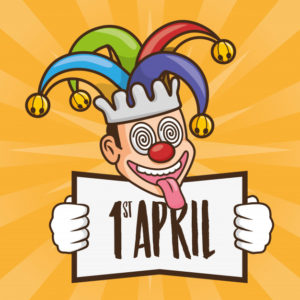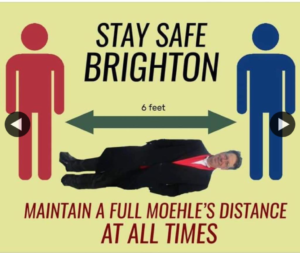 April Fools’ Day has been celebrated for several centuries by different cultures. Traditions include playing hoaxes or practical jokes on others, then yelling “April Fools!” at the end to clue the subject in on the prank.
April Fools’ Day has been celebrated for several centuries by different cultures. Traditions include playing hoaxes or practical jokes on others, then yelling “April Fools!” at the end to clue the subject in on the prank.
Historians have linked April Fools’ Day to festivals such as Hilaria (Latin for joyful), which was celebrated in ancient Rome at the end of March by followers of the cult of Cybele. It involved people dressing up in disguises and mocking fellow citizens and even magistrates and was said to be inspired by the Egyptian legend of Isis, Osiris and Seth.
Some say that April Fools’ Day dates back to 1582, when France switched from the Julian to the Gregorian calendar. In the former, as in the Hindu calendar, the New Year began with the vernal equinox around April first. People who were slow to get the news or failed to recognize that the start of the new year had moved to January first and continued to celebrate it during the last week of March through the beginning of April became the butt of jokes and hoaxes and were called “April fools.” These pranks included having paper fish placed on their backs and being referred to as poisson d’avril (April fish), said to symbolize a young, easily caught fish and a gullible person.
Others claim that April Fools’ Day was tied to the vernal equinox, the first day of spring in the Northern Hemisphere, when Mother Nature fooled people with changing, unpredictable weather.
There is also speculation that it originated in the 16th Century when apprentices were sent on wild goose chases for made-up items. The observance spread throughout Britain during the 18th century. In Scotland, the tradition became a two-day event, starting with “hunting the gowk,” in which people were sent on phony errands (gowk is a word for cuckoo bird, a symbol for fool) and followed by Tailie Day, which involved pranks played on people’s derrieres, such as pinning fake tails or “kick me” signs on them.
In modern times, people have gone to great lengths to create elaborate April Fools’ Day hoaxes. Newspapers, radio and TV stations and websites have participated in the April first tradition of reporting outrageous fictional claims that have fooled their audiences.
In 1957, the BBC reported that Swiss farmers were experiencing a record spaghetti crop and showed footage of people harvesting noodles from trees. In 1985, Sports Illustrated writer George Plimpton tricked many readers when he ran a made-up article about a rookie pitcher named Sidd Finch who could throw a fastball over 168 miles per hour.
In 1992, National Public Radio ran a spot with former President Richard Nixon saying he was running for president again… only it was an actor, not Nixon, and the segment was all a prank that caught the country by surprise.
In 1996, Taco Bell, the fast-food restaurant chain, duped people when it announced it had agreed to purchase Philadelphia’s Liberty Bell and intended to rename it the Taco Liberty Bell.
In 1998, after Burger King advertised a “Left-Handed Whopper,” scores of clueless customers requested the fake sandwich.
Google notoriously hosts an annual April Fools’ Day prank that has included everything from “telepathic search” to the ability to play Pac Man on Google Maps.
But this year, as the coronavirus pandemic wreaks havoc across the globe, some companies are reconsidering their gags, and social media is calling for people to consider skipping pranks altogether, particularly any related to the virus. Google said it would forgo its annual ritual of sharing April Fools Day jokes across the company’s platforms out of respect for those fighting Covid 19.
As cases grow, so does fraud and misinformation online in the form of conspiracy theories, hoaxes and memes. Google, Facebook and Twitter joined to help combat the spread of misinformation on their platforms. Hopefully people will be more conscious of potential misinformation, and pranksters will not cross the line between humor and harm.
 However, in such difficult times, when much of the population is staying at home and news is grim, a little levity can bring a welcome respite. Two Rochester examples: Our local cinema posted on its marquee: Now Playing Everywhere- HOME ALONE. Our town supervisor, Bill Moehle, at 6 feet 8 inches tall, stands out in a crowd. Lawn signs bearing his image are popping up all over town.
However, in such difficult times, when much of the population is staying at home and news is grim, a little levity can bring a welcome respite. Two Rochester examples: Our local cinema posted on its marquee: Now Playing Everywhere- HOME ALONE. Our town supervisor, Bill Moehle, at 6 feet 8 inches tall, stands out in a crowd. Lawn signs bearing his image are popping up all over town.
April Fools’ Day has endured through world wars and pandemics in the past. Let us pray we will be able to celebrate it in a more traditional fashion next year. Remember to wash your hands and observe social distancing. Stay safe and be well.
Lots of LovEstelle